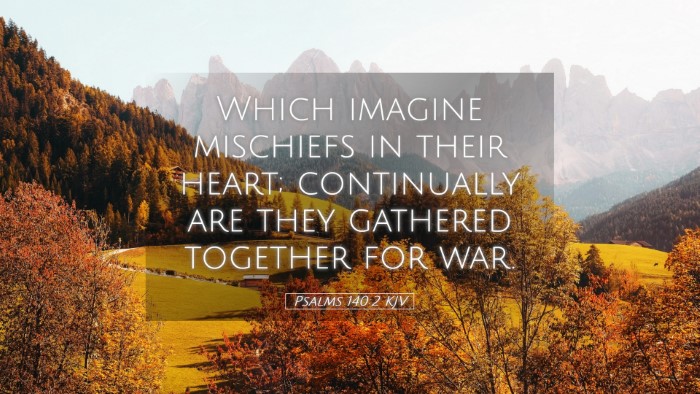Commentary on Psalms 140:2
Psalms 140:2: "Which imagine mischiefs in their heart; continually are they gathered together for war."
Introduction
This Psalm, attributed to David, reflects his deep distress and reliance on God amid his adversaries. David's reliance on the Lord is a recurring theme throughout the Psalms. His candid expressions of fear, anguish, and ultimate faith offer rich lessons for spiritual growth and pastoral ministry.
Historical Context
David wrote this psalm in a period of intense conflict, likely during his fleeing from Saul or during the uprising of Absalom. Understanding this context is key to grasping the urgency and gravity of his words.
Verse Analysis
Psalms 140:2 presents a vivid picture of David’s enemies:
- Imagining Mischiefs: The enemies of David are depicted as malicious, harboring evil thoughts and intentions. This phrase necessitates a contemplation of the human heart’s potential for wickedness, as reflected in Ezekiel 18:30 and James 1:14-15, emphasizing the Biblical warning against allowing such thoughts to take root.
- Gathered Together for War: The continual conspiracy suggests a relentless pursuit and unity among his foes. This can be likened to a well-organized military campaign against David. For believers today, this reflects the reality of spiritual battles, underscoring the need for vigilance against both internal and external threats.
Insights from Matthew Henry
According to Matthew Henry, this verse illustrates the nature of David's adversaries as *plotters of mischief*. Henry emphasizes the importance of recognizing the evil that can reside in the hearts of individuals, suggesting that such malice not only seeks physical harm but also spiritual destruction. He encourages believers to seek God's protection from such malign intent.
Insights from Albert Barnes
Albert Barnes expounds on the phrase "imagine mischiefs in their heart," interpreting it as indicative of a deliberate and premeditated nature of evil. He states that the enemies are not merely acting upon impulses but are engaged in an ongoing scheme against David. Barnes emphasizes the need for prayer and divine intervention, noting that while David's situation is dire, his supplication to God reflects a profound trust in divine justice.
Insights from Adam Clarke
Adam Clarke elaborates on the term "gathered together for war," noting the habitual nature of the adversaries' plotting. He highlights that this can represent the collective effort of evil forces against the righteous. Clarke offers insights into the spiritual warfare that believers endure, reflecting on Ephesians 6:12, reminding us that our struggle is not against flesh and blood but against principalities and powers.
Theological Implications
This verse serves as a reminder of the realities of evil and the necessity of relying on God's strength and support. The plotting of the wicked is an ever-present reality in a fallen world, emphasizing the importance of steadfastness in faith, prayer, and moral integrity.
Application for Today
For today’s believers—whether they be pastors, students, or scholars—this verse calls for recognition of the patterns of deceit and malice in society. It encourages:
- Vigilance: Be aware of the inherent evil in humanity and the need to stay alert against spiritual dangers.
- Prayer: Foster a strong prayer life, seeking God’s protection and guidance in times of conflict.
- Community: Encourage unity within the Christian community to withstand the collective plotting of evil.
Conclusion
Psalms 140:2 invites deeper reflection on the nature of evil and the assurance that God is a refuge for those who sincerely seek Him. The collective wisdom from public domain commentaries offers a profound understanding of this text, encouraging believers to stand firm in their faith amid adversity. Ultimately, it serves as a reminder of the power of prayer and reliance on God's divine protection against the schemes of the wicked.


